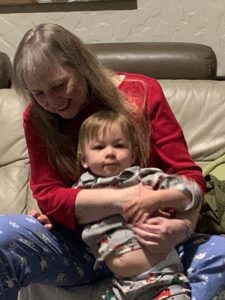A team struggle moving us forward
When my wife, Robin, was diagnosed with a terminal cancer and given 6 months to live in November 2022, we knew we had to gather up-to-date information to give her a chance at survival.
We were also expecting our first grandchild, a boy. However, Robin believed she might not live long enough to hold him.
The medical literature revealed “no cure,” but a “biomarker analysis” from Cedars-Sinai Medical Center, based on the biopsy sample, indicated that a mutation caused the cancer.
A team of oncology experts gathered for our case, beginning with a 9.5-hour surgery to remove as much cancer as possible, followed by concurrent radiation and chemotherapy over the next seven weeks.
After a year, this aggressive cancer returned with metastasis to the lungs and soft tissue. Consequently, in collaboration with experts from Cedars, we were referred to MD Anderson in Houston, Texas.
With the “biomarker analysis” in hand, they recommended a “targeted” medication used for lung cancer with a similar mutation found in her thyroid cancer.
It worked!
Robin is not considered “cured” at this point, but scans and blood tests indicate that the treatment has been effective.
We have flown to Houston three times and had telehealth visits online with MD Anderson oncology experts providing guidance in collaboration with our doctors at Cedars-Sinai.
There is no doubt, this team approach from both medical centers has resulted in this consequential outcome.
Unfortunately, the pandemic Executive Orders allowing telehealth visits to cross state lines have expired, forcing us to travel to Houston for their expertise.
Doctors and the public are in the dark on this issue, but those facing the continued threat of cancer face it every day, and they cannot presently seek help from out-of-state Cancer Centers of Excellence.
Many of us have attempted to bring this to the public’s attention through writing in journals and lecturing.
Shannon MacDonald, MD, a radiation oncologist at Harvard Medical School, and Caleb Trotter, JD, a Sacramento expert attorney on this subject, presented a session entitled “Telehealth medicine: Not available across state lines” at the International Thyroid Survivors’ Conference last September. I moderated the session.
The struggles of having telehealth visits with our doctors in Houston were mirrored in our online thyroid cancer support group. We needed to move forward legislatively.
Robin and I are members of the California Senior Legislature, so we submitted a proposal to allow out-of-state doctors to conduct telehealth visits with California residents. However, we could not find anyone willing to introduce it into legislation.
In discussion with our friends, Jeri and Carl Goldman, who own our local radio station (KHTS) and provide many resources and assistance to the Senior Center, they mentioned that they would inquire with our local state Senator Suzette Valladares regarding her interest in our proposal.
We worked with her policy analyst, Caroline Strouse, and on February 19, 2025, Senator Valladares introduced our proposal as SB-508 to the State Legislature! Thank you to Senator Valladares and the Goldmans!
We recognize that this is a significant step in the right direction, and without our team, many individuals would continue to suffer. The work needed to pass this bill is just beginning, and there will be “stakeholders” (lobbyists) who may oppose this online medical care.
We hope this community and others interested will join Senator Valladares, the Goldmans at KHTS, the California Senior Legislature, and the many doctor and lawyer advocates who understand the importance of working together to ensure that everyone receives care from the best doctors in the country.
Robin and I have been very lucky to have our team guiding us through this ordeal. We also have a second grandchild and hope to have more.
By the way, the oldest grandson is almost two years old, and his name is Robin.
Gene Dorio, M.D.
Originally posted on the KHTS website 3-8-2025
Leave a Comment